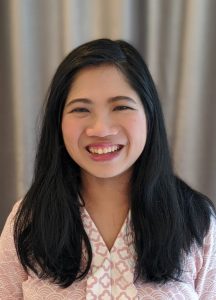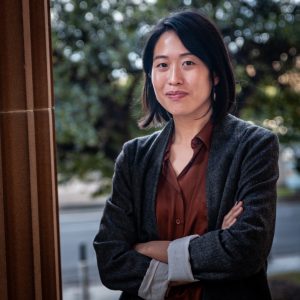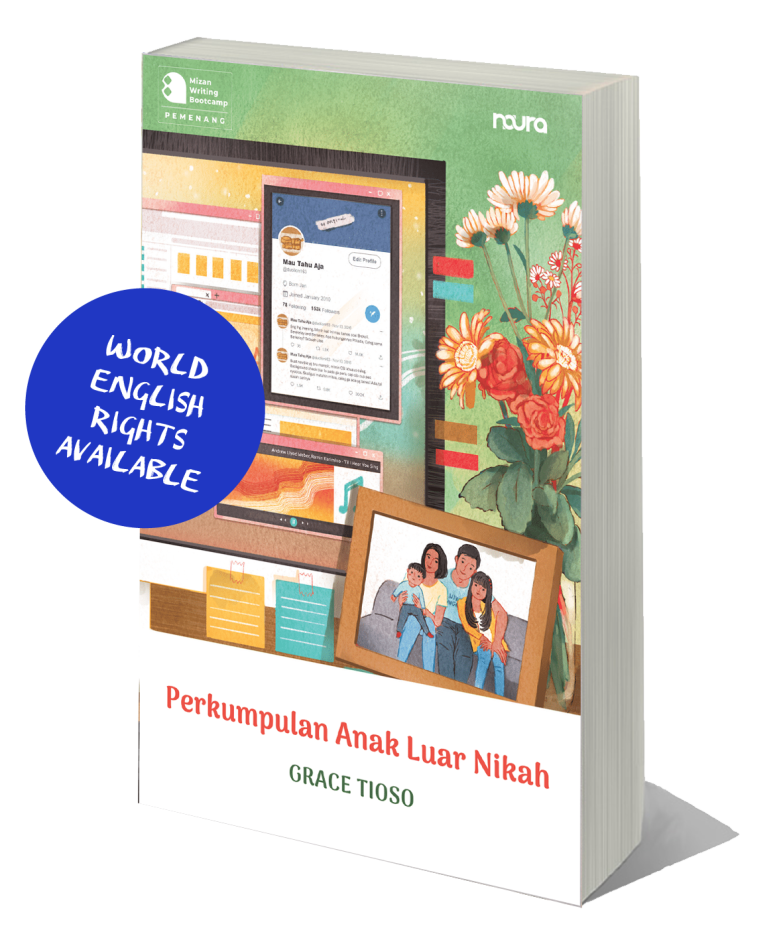

About the book
Martha Goenawan, a bright young Chinese-Indonesian mother living in Singapore, spends her time tending to children and housework. That is, when she’s not busy co-masterminding an anonymous viral Twitter account devoted to uncovering Indonesian politicians’ lies. When her personal life becomes the heart of a scandal, Martha faces public outrage, potential imprisonment, and perhaps, deportation. The future looks bleak.
A heartwarming contemporary tale interwoven with historical elements and set across Singapore and Indonesia, The Born Out of Wedlock Club is about healing the scars of intergenerational racial trauma, navigating diasporic identity, and the power of friendship and community.
What our readers say
As we witness the rise of authoritarianism on a global scale, it is ever more important for us to learn from history – to remind ourselves that we are always one step away from reenacting tragic devastation. Tsao’s endeavour to translate this book – one that discusses the aftermath of a dark page in Indonesia’s history – both educates potential readers but also provides a breath of fresh air for the market by presenting its narrative in an approachable way. The translation manages to retain the playfulness of the original without erasing the cultural nuances, giving us a good glimpse of Indonesian culture.
–Anandita Budiman & Sekar Larasati Sulistya
What our panellists say
Tiffany Tsao’s deft translation of Grace Tioso’s The Born Out of Wedlock Club had me hooked from the opening lines. In it, a young Chinese-Indonesian mother spends her days exposing dishonest politicians though her anonymous, viral Twitter account – until a past deception of her own comes to light. Traversing Singapore and Indonesia, The Born Out of Wedlock Club is about healing the scars of intergenerational racial trauma, as well as the power of friendship and community. At once playfully witty and a thoughtful exploration of diasporic identity, Tioso’s novel buzzes with humour and life, and Tsao’s translation doesn’t miss a beat.
–Elisabeth Jaquette
Awards and press
Winner of the Mizan Writing Bootcamp 2023
Winner of the Ayu Utami Literary Prize for Debut Novels 2024
Rights available
World English
Translation extract
From The Born Out of Wedlock Club
Grace Tioso
translated by Tiffany Tsao
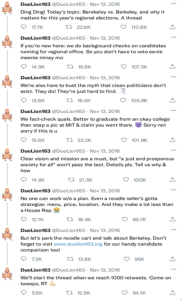
Chapter 1
Singapore
6 January 2017, 10:28 AM
In nine hours, Martha’s face would be plastered all over the news, but currently, she was hurrying to catch the MRT.
The shops near the station had already swapped Christmas trees and fake snow for dancing lions and the character 福. Move over Mariah Carey, make way for Teresa Teng. Where Santa Claus had once stood in front of the supermarket, there was now Cai Shen Ye, the God of Wealth. Chinese Santa, basically – both jolly, both middle-aged men. Dye Santa’s hair black and make his beard pointy, swap out the beribboned present for gold ingots, and voila! Goodbye, Christmas, hello Chinese New Year.
It never ceased to amaze Martha – the annual efficiency with which Singaporeans moved from celebrating a Western holiday to a Chinese one. Then again, for most shopkeepers, it wasn’t so much a matter of culture as of seizing the opportunity to make more cash.
As she approached the turnstiles, an LED sign board announced in green letters that the next train was arriving in two minutes. She quickened her pace, as much as the baby strapped to her front would allow.
Martha was already petite, but sandwiched between the baby carrier and her enormous backpack, she was barely visible. Still, she could move more efficiently with the carrier than a stroller. And to her, every extra second was one she could spend gathering retweets. She stole a downward glance at little Daniel. He yawned and she planted a kiss on the crown of his head. She’d been breathing it in for eighteen months now – that distinctive baby smell she so loved.
Go to sleep, little one. It’s time for Mommy to work. And to have fun.
A smile spread across her lips. It had been months since her last get-together with her friends. Martha was already looking forward to today’s gathering. She needed a good laugh, not to mention adult conversation; talking to the supermarket staff didn’t count.
When she reached the platform before the train arrived, she breathed a sigh of relief. Signs in bright neon yellow warned passengers:
Do not cross the line.
For your own safety.
Danger
And beneath those words:
Bahaya. ஆபத்து.危险
There it was, spelled out in four different languages – English, Malay, Tamil, and Mandarin, permitting no loophole for lawbreakers to slip through claiming they didn’t understand English. This was Singapore. Here, the government didn’t let you get away with anything.
Hearing the train pull into the station, the passengers hurried forward. As if on command, everyone boarding the train formed neat rows, giving way to the people who were getting off. Martha recalled her days as a newcomer in Singapore and grinned.
Back in 2001, for the first time in her life, she had boarded a plane and left Indonesia. When she’d arrived in Singapore, her jaw had dropped at how everything was so neat and orderly. Why is everything here so organised? What the hell is going on?
Every cranny and crevice of life in Singapore seemed to be stuffed with rules. Riding the escalator, for example: you had to stand to the left and keep the right side clear for people who were in a rush.
There were even rules for queuing for the toilet, which, of course, Martha hadn’t known. Instead of standing at the back of the line, she’d waited at one of the stalls. A grandma had stared daggers at her and muttered something in a language Martha didn’t understand. Only when the old woman began pointing at her, yelling, and gesturing behind her did Martha figure it out: she’d cut the queue. Hastily, Martha ducked her head in embarrassment and walked to the back of the line. Unfortunately, the old woman had continued anyway, pointing and muttering away.
The train doors slid open. Martha entered the carriage and hurried to an empty courtesy seat, reserved for pregnant women, the elderly, and people with kids. The East-West Line was packed today! She rummaged around in her bottomless backpack for her phone, nestled among the baby wipes, diapers, and crayons.
As she opened the email app, her eyes wandered to the signs posted around the train. They always stirred up old memories.
No eating or drinking. Fine $500.
No smoking. Fine $1,000.
No flammable goods. Fine $5,000.
No durians.
The penalty for durians wasn’t specified. The first time she’d seen the sign, Martha’s brain had gone into overdrive, wondering how much it could possibly be. $5,000? $10,000? Nobody knew. Positively terrifying. Why not just state outright how much the fine was?
That had been fifteen years ago, and the sight of so many fine signs had made Martha anxious. What if she unconsciously committed a minor wrong and got slapped with a fine? In this country, even the simple act of chewing gum was against the law. What if she got deported? What about the scholarship she was on? What if they looked into her documents and discovered the truth?
During those first few days in Singapore, Martha’s heart had raced in constant worry. She was always biting her lip. Would her secret be found out?
But months passed – of sitting on the MRT, reading the fine signs, and having nothing bad happen. Over time the fear vanished.
Now she’s fine with all those fine signs.
The penalty notices were, of course, scary in and of themselves, but there was something even more terrifying about them: fines in Singapore weren’t empty threats, they were actually enforced. No leniency granted. No under-the-table bribes. No compromise. Not like back home.
Daniel stirred in the carrier, bringing Martha back to the present. I’d better do some work while he’s asleep. Luckily, Martha was used to working anywhere: on the MRT, on a park bench, even at the kitchen counter as she waited for the fish to steam. Being a mother of two young children had turned Martha into a goddess – more specifically, Durga, with eight arms.
Martha checked her email and clicked on the document that Yuni, her cousin and partner in crime, had sent her. Before reworking any information into Twitter-friendly format, Yuni always sent it to Martha for checking first.
Regional Elections 2017_Candidates.doc
The document contained photos, biographies for candidates running for various regional positions, information on the candidates’ parties, lists of website URLs.
Ahmad Ardiansyah.
Candidate for the Regency of Purwomarga
Martha clucked in astonishment as she read Ahmad’s CV: graduated cum laude from UI with a Bachelor’s in International Relations, awarded an scholarship to pursue a Political Science MA at Columbia University, a GPA of 3.7, an endless list of work experience at various organisations, from a United Nations internship to a leadership position at Indonesia Going Global, to a stint as the Governor of East Java’s special staff. Unlike many other scholarship recipients, who’d reneged on their obligation to return to Indonesia, Ahmad had returned to the motherland right away.
Every night, Martha sat by her children’s beds, waiting for them to fall asleep. She never spent time daydreaming or watching K-dramas on her phone. Instead, her brain was always hard at work, figuring out which politician to flay next.
The MRT sped along, as did Martha’s thumbs.
If all politicians were like Mas Ahmad, I’d retire today! There’s a thread, but I’m waiting for 1007 likes. Come on, Tweeps, let’s go!
Initially, Martha had hated the idea of chasing likes and retweets. She’d even complained. ‘Do we really have to do this, Yun? It’s so demeaning.’
Yuni had responded with good humour, in her strong Javanese accent. ‘Demeaning? Honestly, Ta, who cares? Our political analysis may be solid but if no one reads it, what’s the use?’
Yuni had then pointed to examples from leading Twitter mavens who’d deployed various strategies to get retweets, with success.
‘Look at this one. She’s sharing a horror story about a bunch of college students lost in the woods. But she doesn’t tell it right away. First, she hooks them, then she asks for retweets. The numbers are off the charts! Akeh to?’
Without Yuni, there could be no DuoLion163. Sure, Martha did all the analysing, but Yuni packaged it in everyday, down-to-earth speak. The result? In mere months, they were scooping up followers like sand. How Yuni’s laughter rang out when DuoLion163 reached a hundred thousand followers. One hundred thousand!!
‘It’s all thanks to Yu Ti. Remember her? The roast chicken seller at the market? When I write, I think of someone like her. If she gets it, anyone will!’
Sometimes, Martha felt Yuni should have gotten that scholarship from the Singaporean government, not her.
Martha opened Twitter and glanced at their follower count: 226K. She reviewed their old tweets. Her eyes shone as they took in the numbers: 250K likes, 87K retweets, 2.9K comments.
Yuni once asked her why there were always fewer comments than likes. Martha thought Yuni was feigning ignorance when she realized: Yuni was smart and had amazing instincts, but there were still a lot of gaps in her knowledge.
‘It’s the 1% rule, Yun. People who comment or create content like us make up only 1% of people who use the internet.’
‘Oh, I see. And here I was, thinking we were doing something wrong.’
Yuni chuckled innocently – yet it cut Martha deep. What if Yuni had been the one who’d gotten to study in Singapore? How differently her cousin’s life might have turned out. She’d probably be running a start-up, not an anonymous Twitter account.
Martha and Yuni were both housewives, and DuoLion163 provided not only amusement but affirmation. Behind the housedresses and curlers were minds to be reckoned with.
There was one problem: what they achieved through DuoLion163 could hardly be paraded in public. Martha didn’t dare tell her family, especially not her mother, who was sure to pass out if she discovered that her daughter had crossed the line.
To Martha’s mother, Chinese and politics didn’t belong in the same sentence. A firm boundary, albeit invisible, separated their kind from the political arena. If Martha crossed the line on the MRT platform, her life was the only one at risk. But there was no telling what the consequences would be if the invisible line between Chinese and politics were crossed. It was like No durians. How high would the fine be? How great the cost?
These days, the world of Indonesian politics was in turmoil over issues like religion and race. A politician of Chinese descent was running for governor and people were divided. Some of the younger Chinese voters saw him as a role model, someone brave enough to cross the invisible line. But the older generation, the likes of her mother’s friends, weren’t so keen.
‘He’s too blunt,’ they grumbled. ‘If he offends anyone, we will kena and become the scapegoat. You know what they’ll say: typical arrogant Chinese.’
During one of his political campaigns, the politician had been accused of blasphemy. People were outraged. Martha shuddered when her mother sent her a YouTube clip of a group of children chanting a familiar nursery rhyme but with different words: Kill him, kill him right now.
Protests sprang up everywhere. At their height, Martha called her mother to check in.
‘We’re all at home,’ her mother said, sounding nervous. From her voice, Martha knew the fireproof steel door at the house entrance had already been lowered into place.
‘Papa’s there? You’re both safe?’
‘We’re safe,’ her mother sighed. That made three sighs in one minute. She could tell her mother’s anxiety levels were through the roof.
‘This is why we Chinese should never get involved,’ her mother had continued. ‘The important thing for people like us is to get along with our neighbours and not stir up trouble. Don’t get mixed up in politics. We’ll just make enemies that way.’
Her mother had never liked playing with fire. Whenever Martha read about the protests back home and called to ask about them, her mother would merely shake her head.
‘Better not get involved. Better to keep the peace.’
An ever-repeating mantra. But Martha was grown up now. Platitudes had long ceased to satisfy her. Though Martha and her mother shared the same DNA, they couldn’t have been more different. Her mother chose to hide behind a steel door and shower the local authorities with gifts. But Martha was choosing to fight, to blur the line, to prove her mother wrong. How would keeping up good relations with the neighbours resolve the debate over the proposed bill to protect women? How could sending some minor official a steady stream of cakes end the intolerance that was on the rise? How could she stay silent as children her daughter’s age chanted cheerfully about killing someone?
Martha wasn’t doing battle with a sword. Informative twitter threads were her weapon of choice. Instead of leading armed troops, she steered her followers into sharing facts, boosting a candidate’s electability, or destroying the reputation of someone unfit for office. If she were ever attacked, her followers were sure to come to her defence. To the rhythm of Daniel’s soft snores, Martha reread the lines Yuni had sent her and replied with an okay.
Behind DuoLion163, no one could tell whether her eyes were slanted or round.
Martha thought she had found a way to contribute to her country.
She thought she was safe.
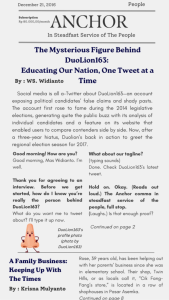
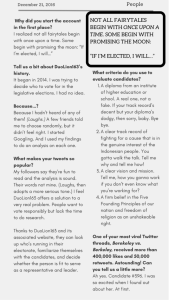
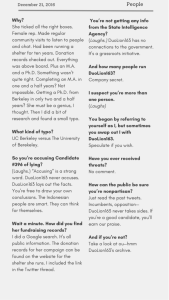
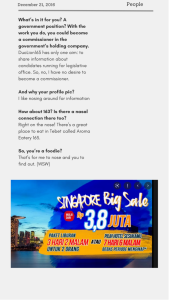
Chapter 2
Singapore
6 January 2017, 12:30 PM
Martha never liked going to Orchard Road. She didn’t find anything appealing about it – just expensive shop after expensive shop. All too often, they were packed with her countrymen – the rich variety, that is. Singapore was a popular tourist spot for Indonesians who had cash to spare. Usually, she stayed away as much as she could, but today she had a date with old friends she’d known since secondary school. She could hardly believe they’d been friends for so long.
Martha exited the Orchard MRT station and took several wrong turns before reaching Hoshino Coffee.
‘Ta! Over here!’ she heard two women squeal from inside the cafe.
Martha spotted them and waved. Fanny was wearing a bright yellow sundress that accentuated her tall, slender frame. A carved wooden pendant was draped around her graceful neck.
‘Fan! Look at you! So Sanur chic!’ chuckled Martha, giving her friend a hug. The Bali sun had turned Fanny’s skin a golden caramel, making her look even more striking. ‘How long are you in Singapore?’ she asked.
‘Till next week,’ replied Fanny, smoothing her hair. ‘I’m here for an art auction.’
Fanny owned an art gallery in Sanur and she often went back and forth between Bali and Singapore to attend auctions and other art-related events.
Martha turned to greet her other friend, a petite woman with a short bob and scarlet lipstick, in a black maternity dress and red pumps. Linda always wore something red, ‘for good luck’ she said.
The three of them had always made an odd combo when it came to dress sense, even in the earliest days of their friendship: laid-back Fanny in her Esprit T-shirts, Linda copying the latest fashions from the teen magazines, and Martha in no-brand clothes she’d scored on sale at Mangga Dua. The socioeconomic differences among them had shifted over the years and Linda’s circumstances, especially, had changed. But Martha never felt embarrassed. She could still recall the days when Linda’s family was always behind with school fees.
And look at Linda now. Gone was the scrawny, undernourished girl who couldn’t afford a new backpack for school. The brands of Linda’s purses went up a grade each year – from Coach, to Prada, and now Hermes. You could always tell how expensive her bag was by how high she held her chin.
‘Congrats, Lin!’ Martha pressed her cheek against Linda’s and caught a heady scent of expensive perfume. ‘A boy this time, huh? When’s the due date?’
Linda grinned. ‘Four more months.’
Martha gave her friend a huge hug. She knew how relieved Linda was about her second being a son. From the outside, Linda’s in-laws looked modern, but what was said in private at the dinner table was always a different story.
‘So which school will you and David have to volunteer at now?’ asked Martha, a mischievous twinkle in her eye.
Linda groaned and gave her friend a playful shove. In this country, the rules didn’t stop at queuing for toilets – they applied to choosing schools too. Martha had been astounded when Linda told her and Fanny the tactics she’d used to get her daughter into the school of their choice.
It wasn’t like Indonesia, where you had to make a big donation, but you did need to live less than two kilometres away. Always thinking ahead, Linda had purchased a condo next to the prestigious all-girls school she’d had her eye on, even before marrying David. The property prices in that area were expensive, but Linda hadn’t cared.
In addition to using proximity as criteria, the school had instituted a lottery and point system as well. Parents of would-be students accumulated points by participating in volunteer activities. When Linda looked into signing up, cushy activities like organising the science fair and chaperoning field-trips were all full. The only spots left had been directing traffic in front of the school.
The result: Linda’s husband, David Kwek, Senior Director of Finance for the Asia-Pacific at his company, flew back to Asia from New York, caught a meeting in Shanghai, attended a business dinner in Bangkok, and turned into a primary school parking attendant upon touching down in Singapore, all for the sake of scraping together points. The thought of David swapping his designer suit jacket for a bright orange vest had given Martha and Fanny a good laugh.
Fanny was Linda’s opposite. Easy-going. Laidback. She’d been married for over five years and still laughed whenever people asked her about having kids.
‘I like being the cool aunt,’ she’d say. ‘I’ll spoil your kids rotten, and when they cry, I’ll hand them back.’ Fanny to a tee.
‘What are you having?’ asked Linda, interrupting Martha’s thoughts.
Martha didn’t take long to decide. She ordered and closed her menu. Linda pounced.
‘So,’ said Linda, folding her hands and looking pointedly at Martha. ‘Still active on Twitter, Ta?’
Martha chuckled. Linda wouldn’t be Linda if she beat around the bush.
‘Yep.’
‘Why bother with Indo politics?’ Linda chided. ‘You live in Singapore now.’
‘Last I checked there’s still a Garuda on my passport,’ said Martha tensely, flashing a grin.
Fanny broke in. ‘Don’t be so harsh, Lin.’ She turned to Martha. ‘By the way, I loved your interview in The Anchor! And you looked great!’
Martha chuckled even harder. ‘What looked great? My Twitter profile pic? Well, obviously. It’s from the sign at our old hangout, remember? Aroma Eatery 163.’
The three of them burst out laughing. Aroma Eatery 163 did indeed hold a special place in their hearts. Back in Jakarta, in secondary school, they’d travel all the way to Kelapa Gading to eat there.
Fanny merely giggled at being found out. Everyone knew Fanny never read newspapers.
‘Moses was the one who saw it,’ confessed Fanny before adding admiringly, ‘He said you sounded very smart.’
Martha’s smile vanished at the mention of Moses’ name.
‘Fan,’ yelped Martha. ‘You told Moses?
‘Why? What’s the problem, darling? He’s my husband!’ Fanny leaned in and added, in a whisper, ‘He’s a Mennonite, remember? His lips are sealed.’
Solemnly, Fanny locked her lips shut with an imaginary key.
Martha shot back a tight-lipped smile in return.
Moses Kauffman: married to Fanny. Handsome white guy. Fluent Indonesian language skills. Devout Mennonite – no alcohol, no smoking. Linda had often teased Fanny, ‘Good-looking but boring,’ followed by a mock yawn.
‘Well, don’t tell anyone else,’ grumbled Martha.
Her Twitter activities were supposed to be a secret between the three of them.
Linda eyed her suspiciously. ‘What are you tweeting exactly? Why are you so scared?’
Martha shrugged casually. ‘Oh, nothing major. It’s all public information – where they went to school, work experience,’ Martha paused and chuckled. ‘One candidate runs a side-business selling wild mare’s milk to men to boost their stamina. Could David use any?’
‘Oh please,’ Linda scoffed with a wave of her hand. ‘Ronny probably needs it more.’
Martha’s face froze, her spur-of-the-moment joke hurtling back like a boomerang. Things with her husband hadn’t always been like this.
She merely shrugged and laughed drily, before picking up where she’d left off about DuoLion163.
‘Candidates’ personal issues are off-limits. Like if you’ve ever been divorced, or been through lots of break-ups, or had a child out of wedlock, or—”
Martha’s voice died and all three of them went silent. Martha felt like slapping herself. What was wrong with her today? It must be lack of sleep. Daniel had woken up four times last night.
Fanny blinked in disbelief. ‘You didn’t bring that up, did you?’
‘Are you crazy? Of course not!’
Just then a woman walked in with six shopping bags, all from different boutiques.
‘Oh no,’ Martha whispered in panic.
You ran into all sorts of high-profile Indonesians around Orchard Road: tycoons, celebrities, and of course, politician hopefuls. Martha knew this in theory, but seeing someone on TV and seeing them in real life were two entirely different matters.
Martha ducked and hid her face behind a menu.
‘Oh, it’s Sunny! Sunny Dew!’ breathed Fanny, instantly recognizing the popular sinetron actress.
‘Her real name is Dewi Sumiarsih,’ muttered Martha in a rush. She pretended to tend to Daniel, who was still sound asleep. ‘She’s running for mayor of Cilegon. Candidate #275.’
‘What are you hiding for, Ta?’ Linda asked calmly. ‘I mean, no one knows who you are.’
Linda’s tone was light, but her words stung nonetheless.
‘Y-yeah. I guess you’re right.’
No one knew her secret, but still, fear caught her by surprise. What if people found out who was behind DuoLion163? Martha had taken great pains to conceal her identity. When she’d mentioned Aroma Eatery 163, she’d referred to the branch in Tebet, not in Kelapa Gading. Kelapa Gading was known for being a Chinese neighbourhood. Tebet, on the other hand, was more…mixed.
‘What’s the point of tweeting if you don’t want people to know it’s you?’ asked Linda archly.
‘It’s complicated, Lin.’
Linda clucked in annoyance. ‘You’re the one complicating things, Ta. You have it good here! Anyone else would have ditched their Indonesian citizenship already. But not you. I’m surprised Ronny hasn’t complained. He travels just as much as David.’
‘He does complain,’ admitted Martha. ‘Last year, he had to cancel a work trip to Copenhagen because there wasn’t enough time to apply for the visa. His colleagues there assumed he was Singaporean.’
‘See?’ said Linda, finger raised for emphasis. ‘A Singaporean passport is an asset, you know.’
She proceeded to go on and on about all the countries David could travel to without needing a visa.
Martha shrugged, indifferent. For most people, easy travel and low taxes were tempting reasons to convert to Singaporean citizenship. But somehow, she felt it wasn’t as simple as that.
Everyone had their own way of dealing with the wounds of the past. Her mother hid behind a steel door. Martha hid behind an anonymous Twitter account. As for Linda, she’d left Indonesia for good. But when it came down to it, wasn’t everyone free to make their own choices?
‘Eat up, ladies,’ chirped Fanny. She sounded like she was hosting a party. ‘Food’s getting cold!’
Martha couldn’t help but smile. Linda the boss and Fanny the peacemaker.
‘Daniel’s such an easy baby,’ observed Fanny admiringly. Daniel dozed on.
‘He can sleep up to three hours in the carrier!’ said Martha.
Conversation turned to lighter matters: general gossip, who was getting married, who was getting divorced.
‘Sari takes the school bus?’ asked Linda, dabbing her lips with a tissue.
Martha nodded and glanced at her watch. Hopefully she could find a taxi. She wanted to make it back before Sari got home.
‘I’ll give you a lift,’ said Linda, grabbing her purse. ‘I’m holding a viewing for a Nassim Road property in two hours.’
Nassim Road. Lined with luxurious houses and apartment buildings priced as high as the sky. As a real-estate agent catering specifically to rich expats, Linda was doing pretty well.
‘No need, Lin,’ protested Martha. ‘It’s too out of your way. And where will I put Daniel?’
‘This is Singapore! Nowhere’s out of the way. And lucky for you, we’ve just installed the new car seat.’
With that, Linda strode ahead without giving Martha another chance to refuse. Martha could only shake her head.
How different the three of them were. Yet fate had brought them together, all through four words printed on a document. Born out of wedlock.
